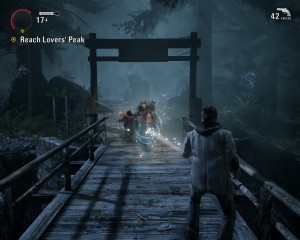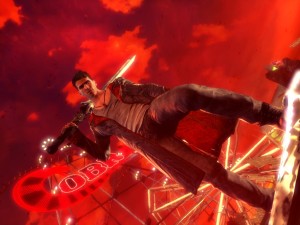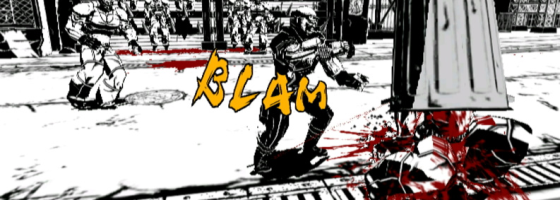When Moebius was reviewed there was one area that a lot of people saw as a problem with the game: the protagonist and how impersonal he was to everyone around him. This isn’t the first time where a main character had such an impact on the perception of the story and I want to talk about the popular archetypes of main character design.
The Eyes of the Story:
The main character in any narrative is obviously an important part as they are our guide to the world and story around them. In narrative today, there are three popular types of main characters written regardless of the medium.
First is the relatable character, someone that the audience can root for either because their situation is similar to something in their life or they can project themselves into this character. Adult and young adult fiction books make heavy use of this as they write to attract an audience that wants to live through their characters. See also romance movies that appear on the Lifetime network.
Another part of this is “the everyday hero –” the man or woman with no special powers or abilities put into an extreme situation such as John McClane in Die Hard, Ripley in Alien and so on. These are characters where you can relate to them in the sense that you are just like them or can root for the common person succeeding.
Next is the straight man or “cool person.” This is someone that you can’t project yourself into because they are just better than you. These are characters that usually exist above the rest of the cast and stand apart as being superior. Some examples would be James Bond, Wolverine, Batman, Dante and so on.

Everyday characters are popular in horror titles to see how a regular person would deal with the situation.
So instead of rooting for them as a projection of yourself, you usually root for them as they’re just so good at what they do that you want to see what they do and how they get out of a situation.
These characters are the ones that power fantasies are build for as while the audience can’t be them, they can still imagine being like them.
Another major part is that they stand out from the rest of the setting or situation, so while everyone else may be going crazy and bad things are happening, these characters keep their cool and handle things.
Finally we have the hardest to write for: the un-relatable character. This is someone who is so polarizing or provocative that the audience doesn’t want to be anything like them. Some examples would be Gregory House, Hannibal Lector, Dexter Morgan and Walter White.
Many of these characters come with some disability, illness or strange quirk that further separates them from the audience. These are characters that become popular in one sense as someone you love to hate. Or their actions are so disturbing that you want to see how far the writers go with this character and whether they will receive retribution or continue down their path.
Unlike the straight man that exists outside or above the rest of the plot or narrative, these characters are firmly in their own world and the craziness that ensues.
That last part is one of the hardest parts of making an un-relatable character seem appealing to the audience. If a straight man or relatable character has to do something wrong or disturbing, the writers will erase any doubt that the character had another choice. And many season finales and cliffhangers are about these characters having to do something drastic.
For the un-relatable character however, they will do something off-putting without any greater explanation other then they wanted to do it or enjoyed doing it. These characters tend to be the most polarizing and will either earn fans for their disturb behavior, or completely alienate the audience.
It’s interesting to look at it is how these characters can shift the perception of the show or game as well.
The Perception of the Story:
An example that I like to use is the difference in opinion between Madworld and Bulletstorm. Both games were about over the top violence mixed with dark humor.
The funny thing is that looking at the media surrounding both games, Bulletstorm was the game that was torn apart more for its subject matter. Madworld in my opinion was more mature: Featuring more violence, dirty jokes and even a few stereotypes thrown in for good measure. Not only that but it was released on the Wii, AKA Nintendo’s family friendly system.
And I feel part of the problem in perception came from how the two main characters were portrayed. Madworld’s main character Jack was considered a cool character: Calm, always in control and had a chainsaw for an arm. While he did do incredibly violent things, he never became engrossed by it or made jokes like the announcers were. In essence, all the profanity, extreme content and language were separated from Jack.

Un-relatable characters aren’t meant for the viewer to project themselves into, but are interesting to watch and see what they do next.
On the other hand, Grey from Bulletstorm was un-relatable: A loud mouth womanizing drunk who completely enjoyed the killing, profanity and craziness of the game.
The only character who was worse was the main antagonist who said things that I can’t repeat here.
Interestingly, Grey went through more of a character arc than Jack and by the end did grow after having a look at his past actions. But it’s safe to assume that most people didn’t stick with the game long enough to see that happen.
As a funny coincidence, both characters were voiced by the same voice actor: Steve Blum. Who despite sounding similar of course, had different tones related to their personalities. And it’s interesting to hear him talk as introspective Grey and despite being a more serious tone, was still different from how Jack spoke.
Characters changing through a story can also impact the audience’s perception and one of the best examples of that would by the arc shown in Breaking Bad. Walter White started out as a relatable character: A middle class teacher trying to make ends meet who is stricken with cancer. The character starts out doing whatever he can to protect his family and get them enough money to live after he’s gone.
And for the first few seasons, people rallied behind Walter, hated his wife for getting in the way and wanted to see him succeed. But then the character changed for the worse as his actions became more extreme and veered into un-relatable territory.
I know some people found Breaking Bad hard to watch after that point, as they preferred Walter when he was this relatable guy. Instead of watching to root for Walter, it transformed into seeing just how far Walter will go and how things will end.

A character like Dante is a perfect example for power fantasy fans as he is always in control or on top of what’s going on.
Un-relatable characters both in video games and other mediums will turn heads, whether they are turning towards or away from your content is another story.
Simply put, there is no way to design an un-relatable character that is going to appeal to everyone; there’s a reason they’re called un-relatable.
Once a character reaches a state of being un-relatable like in Breaking Bad, you can’t un-ring that bell and it’s up to the skill of the writer or writers to see things through till the end. And while it may be far easier to write relatable or cool characters, it’s the people we love to hate that stay with us the longest.


